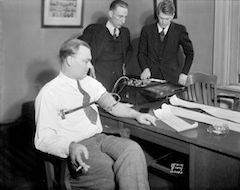Rick Helms Exposes Inaccuracies In Lie Detector Article
We often post guest articles written by experts. And, normally I check the content for accuracy before posting. However, today one slipped past me. Fortunately, my pal Rick Helms was quick to step in to make sure our readers receive only the best information available. So, here’s the original article as submitted. Please read Rick’s comments below to see how things are really done.
The original article…
You’ve seen them on TV crime dramas. A potential suspect is wired to a machine via a series of sensors attached to his body while he is grilled by an expert operator with a series of probing questions. Eventually, a needle goes haywire, and the lie is revealed. Well, not so fast. There are some serious misconceptions about the lie detector test, and we’re going to discuss ten of them below:
- The Name Itself– The first misconception to address is the very name lie detector test. It is more correctly known as a polygraph, and can be more accurately considered to be a truth verifier test, because …
- They Don’t Detect Lies – Polygraphs can confirm that a person is responding truthfully to a question; however, the body functions that are monitored in a polygraph test will not specifically identify a lie, simply an abnormal physiological reaction.
- They Are 100% Accurate – When administered by an experienced professional examiner, a polygraph test can be very accurate in establishing truth or indicating deception, but there are many factors that can alter their reliability.
- They Are Not Admissible In Court – Contrary to the belief even among some lawyers, this is no longer universally true. There have been cases where polygraph results have been entered as evidence in trials.
- You Can “Beat” A Polygraph Test – A professional examiner will conduct a polygraph in three phases – the pre-exam interview, the polygraph exam, and the post-exam interview – over the course of several hours. The exam will include control questions, which are designed to confirm the truthfulness of the responses.
- Drugs Can Help You Beat The Exam – Drugs or medications won’t aid in defeating a polygraph. Part of the pre-exam phase is for the examiner to ensure that the subject is fit to take the exam, and verify if any medications have been taken.
- Nerves Can Affect The Results Of A Test – Nervousness does not register in the same way the physiological response of the nervous system does during a polygraph. Also, the examiner will work with the subject throughout the process to ensure that they are as relaxed as possible.
- Polygraphs Include Trick Questions Intended to Elicit A Response – In fact, the respondent will be made aware in advance, of every question he will be asked in the polygraph exam. There are no surprise questions.
- Control Questions Are Standard Questions With Standard Responses – Not exactly. A control question is not something like “Is your last name Lipschitz”. The purpose of a control question is to induce the subject into giving a deceptive answer, so that the examiner can have reliable measurements of what a deceptive response will look like.
- You Only Fail If You Lie – While polygraphs do have a high percentage of accuracy when administered by a well-trained and qualified examiner, it’s quite possible to be completely truthful and still “fail” a polygraph exam.
*Today’s article brought to you by www.nannybackgroundcheck.com
Now, for Rick Helms’ response to the above article. Remember, Rick is the expert, and his comments are spot on.
I was a practicing forensic psychologist for almost a quarter century, and I now teach college psychology, including a course on Forensic Psychology.
This article was written by a company that has a vested interest in the polygraph as part of their investigative processes. It is also erroneous in several different areas.
The polygraph has an error rate between 25-75%, mostly because–while it absolutely DOES measure physiological arousal on three different domains (blood pressure, pulse rate, respiration, and galvanic skin response)– it is impossible to know the reason for that arousal. Arousal is controlled by a system in the body called the Sympatho-Adreno-Medullary process, and it is entirely autonomic. We have no control over it whatsoever,and sometimes (such as in panic attacks) the SAM system activates for no determinable reason. If a doctor used a test that was wrong 25-75% of the time, he’d be sued out of business within a week.
Nervousness, unlike the statement in the article, is PRECISELY the type of arousal measured by the polygraph. Nervousness refers to a set of physiological responses involving elevated heart rate, increased blood pressure, increased sweating (galvanic skin response), and increase respiration, and is the result of the activation of the SAM system in response to an environmental threat–such as, say, being hooked up to a lie detector with your job or freedom on the line.
You absolutely CAN manipulate the results using drugs, such as beta blockers. Propranolol,for instance, in addition to slowing heart rate and reducing blood pressure, also appears to ‘turn off’ the SAM response, which would produce–at worst–an inconclusive polygraph result. This is one reason researchers are exploring the use of propranolol as a prophylactic to help prevent post-traumatic stress disorder. By stopping the extreme arousal and anxiety associated with the trauma, the drug prevents the formation of the classically-conditioned intrusive flashbacks and dreams and phobic responses symptomatic of PTSD. Propranolol cannot be detected during “pretest verifications” by polygraphers, mostly because they aren’t qualified to do such tests.
The absolute best way to beat the polygraph, of course, is to be born a psychopath. Because of structural differences in their brains (mostly surrounding areas in the limbic system associated with the SAM arousal process), they don’t experience physiological arousal when doing things like stealing or lying. Their test results will be–at worst–inconclusive. In some cases, they will be exculpatory.
Polygraph results may, as mentioned, be entered into evidence in court, but only by defense attorneys as exculpatory evidence, and any attorney who tries to do it is asking to have his ass handed to him because the prosecutor will pull in expert after expert to discredit the evidence.
The only people who truly endorse the polygraph as a method to differentiate between truth and mendacity are…surprise!…polygraphers. The polygraph is SO unreliable and imperfect that the United States Congress was compelled to pass the Polygraph Protection Act, which forbids businesses from using the polygraph as a hiring tool, mostly because it was found to be discriminatory and a poor indicator of lying.
Every article touting the ‘effectiveness’ of the polygraph also notes that it should be administered by “a well-trained and qualified examiner”. This is a psychological trick called the ‘halo effect’, and may actually be one of the few benefits of the polygraph. By establishing your own expertise, you endow a scientifically useless machine with powers it doesn’t have.
You could (and I have) hook a person up to a stereo receiver, claim it is a polygraph, and then tell the person–forcefully and confidently–that he is lying when he denies his guilt. On the majority of occasions, that person will break down after repeated confrontation and admit their culpability, mostly because they come to believe that the machine has ‘found them out’ due to the ‘polygrapher’s strong endorsement of it. Unfortunately, like many interrogation processes, the potential for false confessions is always there.
Like eyewitness testimony, which is notoriously unreliable, the polygraph has severe limitations and faults, and I have repeatedly told my students to refuse it, if offered, simply because it has no validity or true ability to differentiate between truth or lies.
In fact, the only completely accurate statement in the article is #10. You absolutely can fail this test even when you are telling the truth. In fact, that can happen as much as 25-75% of the time. As a result, I would suggest that, as a forensic tool, the polygraph is essentially useless. It does, however, make a lot of money for polygraphers, so it shouldn’t be surprising that they enthusiastically endorse it and promote it–erroneously–as a valid and reliable assessment tool.
Richard Helms
* * *
Want to learn more about polygraph exams? How would you like to see the equipment in action? Well, the 2012 Writers’ Police Academy is featuring a detailed, hands-on polygraph workshop just for you! And, we’ve just secured more workshop and classroom space so we have a few open slots. Please hurry. Register today!






Excellent information as usual, Rick! I wish I could take your classes! Ever think of teaching an online class to the Guppies or on a web site like Lee is doing? Thanks!
Embarrassed, Jane? Why?
Actually, I think we pulled a fast one on you. I changed the article a bit, adding Rick’s information after you’d posted your comment… 🙂
I am so embarrassed. Sorry, I should read rather than skim.
Thanks for the GOOD information, Rick. I think we’ve just decided to exclude someone from our approved list of guest bloggers…
See above
Lee,
I recall having to go thru a polygraph test for a job. Is this still a common practice? I remember the interviewer telling me the results were inconclusive, but I did get a job offer :).
Jane
My thinking, too, Dave. Even just the mention of a polygraph sometimes starts the confession flowing.
Hi Lee,
From my experience, the great value of polygraphs is not the test result itself, but that the process is used as an excellent interrogative tool. A good polygraphist can ultimately get to the truth through confession.